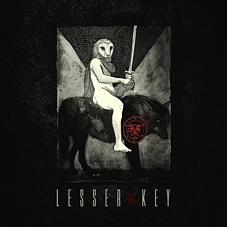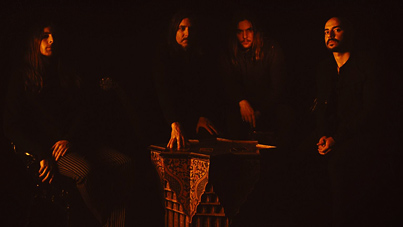|

lire cette interview en Français
Released in April 2014, the EP of Lesser Key was immediately compared to Tool. The reason for this resides in the presence of Paul D'Amour as bass player, even if he's no longer
in the band since 2 decades. But no, the music played alongside Brett Fanger (guitar) and Justin Hanson (drums) as the vocals by Andrew Zamudio don't sound the same, and still are
pretty good.
Salival: First, how was the reception of your EP and tour?
Lesser Key: It was received fairly well. We did some touring with a few different bands, including Cynic and Deftones, a short run in the UK including Reading and Leeds festival, and a live session
at BBC Radio 1 for Rock Show with Daniel P. Carter. We attracted a lot of like minded artists to collaborate and tour with. Overall, it was a success because we got to share the music with some big
audiences and gain some new fans.
So where are you guys from?
We are originally from St. Louis, Missouri. Paul of course has been in LA, but he is from Spokane, Washington. The band was started in St. Louis in 2008.
Your band "represents an exploration into personal and artistic freedom". Can you please develop?
We all have personal taboo interests, and we create around those subjects and our musical influences. Most of the time, we are operating outside of the normal and like to
exercise our freedom to do that. Most bands play and create within a matrix of what is trending right now with labels. We just try to stay true to ourselves and the vision for the art.
How did you meet Paul D'Amour?
Paul reached out after we recorded an unreleased record that somehow he came across online, after a few tracks had been posted on a few sites.
 
What did his presence change?
Paul brought his own unique creative input on the songs. We had him re-record the bass with his tone and some of his additional ideas for the compositions.
He brought attention to the band, but weren't you afraid of comparison to his own projects or even Tool?
Paul is an artist, and he has been involved in a number of projects after he left Tool a long time ago now. We notice the similarities between the two bands, but we are more interested in expanding
upon what makes us unique rather than what binds us to other bands in the genre.
Another link to Tool is the production by Sylvia Massy; how was this process with her?
Working with Sylvia was cool. We were isolated in that small mountain town of Weed, California. It gave us a lot of time to just focus on the recording process with no distractions. The town has a
lot of mythology around it concerning the Lemurians and ETs connected with ancient pre-human civilizations. There’s a presiding energy and vibe there that allows for one to escape the rational mind
and start dwelling into more abstract strains of thought.
What are your major influences, musically and visually as both are important to you?
As far as music is concerned, we have a lot of similar tastes as we like anything that has an artistic edge or unique quality to it. We like a lot of different music and films. As far as this
project is concerned visually, we had the works of Kenneth Anger and Alejandro Jodorowsky in mind, and went as far as collaborating with Brian Butler who is Kenneth Anger’s assistant for the video
of "Intercession".
Then the occult is very present in your concepts and visuals. What does it express to you, and why is it so important?
The occult to us expresses the hidden and esoteric aspects of the nature of Man’s spirit and environment. It provides a real opportunity for one to allow themselves to think outside of the mundane
and widely accepted views of reality.
Now, can you tell us more about your next album? Will it be about Aldous Huxley's Brave new World? (from the recent quote on your
Facebook page)
The new album is coming along. We have a group of songs we are working with and expanding upon. Yet, although Huxley is a brilliant fellow, our new work is not directly related to any of his efforts
or anyone else’s.
|